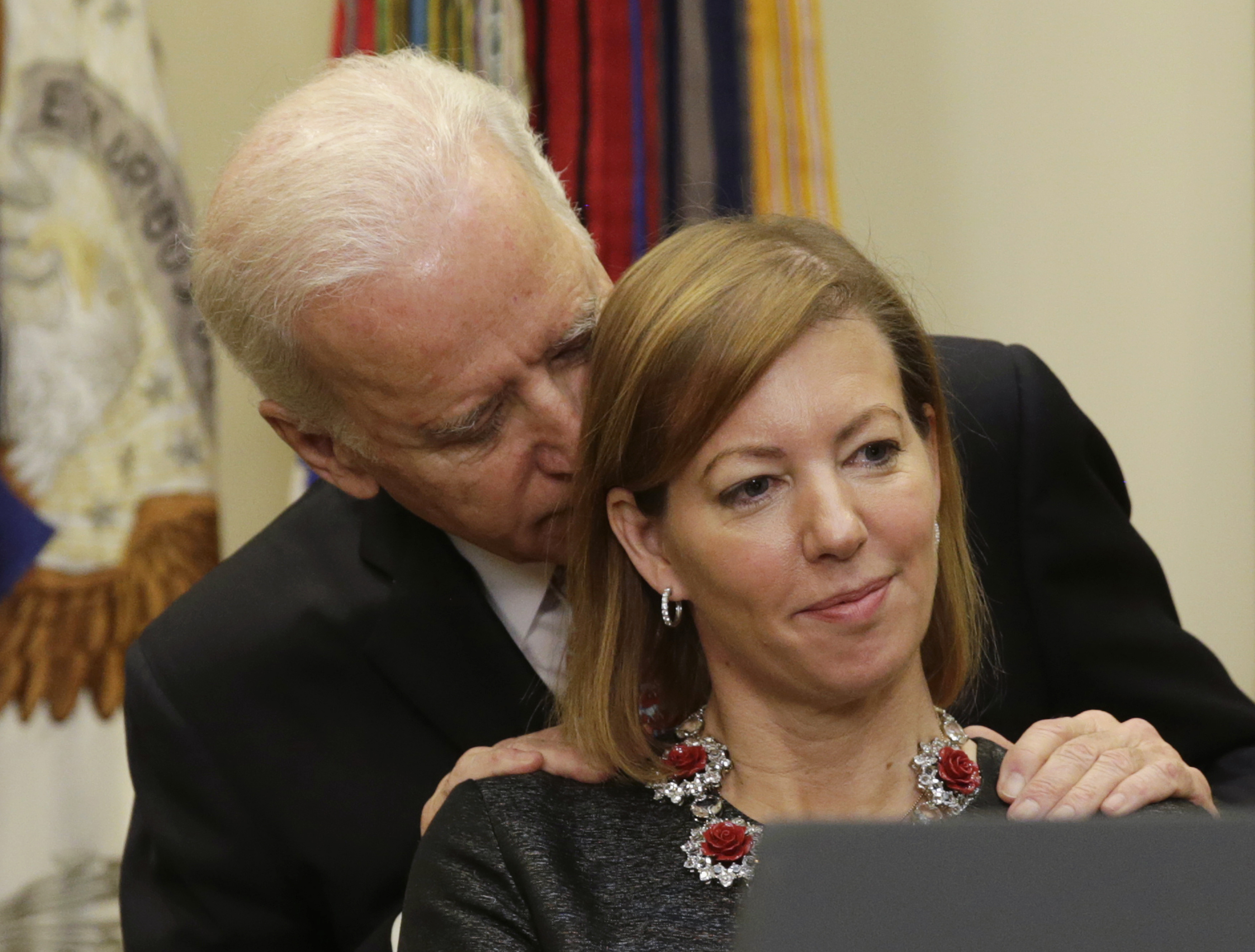Creepy uncle Joe Biden 2020?
Let Biden run — and face the consequences


A free daily email with the biggest news stories of the day – and the best features from TheWeek.com
You are now subscribed
Your newsletter sign-up was successful
The Democrats are starting to feel a bit of wind at their backs. Their lead in the generic congressional ballot poll has opened up to double digits. Twenty-six-year-old lesbians are winning special elections for the state Senate in deep red Oklahoma. The only thing the party is missing is a leader to follow into battle.
That's not for lack of potential candidates. There's Bernie Sanders, the close-but-not-that-close runner up from 2016, with his army of impassioned amateurs. There are populist senators, like Elizabeth Warren and Sherrod Brown, who know how to speak to economic grievance; popular governors like Deval Patrick and Andrew Cuomo with a proven executive track record; and celebrity business people like Oprah Winfrey and Mark Zuckerberg with essentially bottomless personal resources and a profound understanding of how to operate in the contemporary media landscape.
And then there's Joe Biden.
The Week
Escape your echo chamber. Get the facts behind the news, plus analysis from multiple perspectives.

Sign up for The Week's Free Newsletters
From our morning news briefing to a weekly Good News Newsletter, get the best of The Week delivered directly to your inbox.
From our morning news briefing to a weekly Good News Newsletter, get the best of The Week delivered directly to your inbox.
He's as well-known — and well-loved — as many of the celebrities. He's got more experience than anyone, while still being known for entertaining outside-the-box (even wacky) ideas. And he's a lunch-bucket Democrat from Scranton, Pennsylvania, with a decidedly moderate economic record. Sure, he's a little old. But pair him with a rising star like Kamala Harris, and you've got a dynasty in the making.
There's just one problem:
While Joe Biden has been jokingly depicted as a kooky uncle or Obama's wacky sidekick or Leslie Knope's grin-flashing celebrity crush, he's also got a troubling history of acting weird in public around women who don't seem entirely on board. This isn't just based on whispers or rumors; there are so many photos and clips of Biden looming over, or massaging, or gently nuzzling, or whispering to, or kissing women and girls who don't seem all that into it. For awhile, a few years ago, it was a bit of a meme. Gawker wrote on it. So did The Washington Post. And there are plenty of YouTube "Creepy Joe Biden" compilations, in case you want to spend the next hour or so feeling vicariously mortified. [The Daily Beast]
At the moment of maximum outrage over predatory behavior by the likes of Harvey Weinstein and Louis C.K., and at a time when the most powerful engine of Democratic resurgence is angry women, how could the Democrats be so foolish as to choose as a standard-bearer a man whose creepy behavior is similarly an open secret? Allegations against Bill Clinton were dismissed by many partly because they were championed by the right-wing smear machine. Democrats are just coming around to the view that this wasn't the best heuristic for evaluating their veracity. Are they really going to be so quick to gaslight themselves again?
On the other hand, there's President Trump. I decry negative partisanship as much as my colleague Damon Linker, but it's a heck of a motivator — particularly in the Trump era. Jonathan Chait has already expressed sympathy for Republicans who would prefer to be represented by Roy Moore than to lose their majority. Can he really be the only liberal for whom the political trumps the personal?
A free daily email with the biggest news stories of the day – and the best features from TheWeek.com
So: Should Democrats rally around a candidate with high name recognition, a strong fundraising base, a deep well of experience, and a proven ability to connect with precisely the voters who defected or stayed home in 2016? Or should they prove that pussy really does grab back, and shut the door firmly on the idea of opposing Trump with another creepy septuagenarian with notoriously wandering hands?
Or is that possibly the wrong way to put the question?
The impulse to anoint and the impulse to tear down are mirror images of one another. They both partake of a mistaken notion of what political representation is supposed to be in a republic. The American president is not supposed to be a monarch, numinously embodying the nation in herself. She's just the head of the government.
Obviously, emotional identification is a huge motivator of political association — and trust is essential for authority to be perceived as other than tyrannous. But trust must be earned by the system as a whole, not by one leader who claims either exemplary virtue or to be beyond such petty considerations. We should never lose sight of the risks of personalizing that identification, and that trust, to our own mental health and to the effectiveness of political representation itself.
I'm not saying that we should ignore Biden's creepiness, or contextualize it away. On the contrary: I'm trying to figure out how to effectively avoid that very dynamic. Because it isn't just Biden, by any means.
Yesterday, the news broke that liberal lion Al Franken has been accused of groping a sleeping colleague on a USO tour. And if Hill staffers are to be believed, a brick thrown randomly would likely hit a few senators or representatives guilty of the same, or worse. It will be very tempting, in such an environment, to throw up one's hands, hunker down, or find a scapegoat, instead of facing reality square-on.
So let's face that reality. Is it a bad thing that Joe Biden is a creepy boss? It sure is. And that's a bad thing that can be debated publicly as part of an actively contested primary, along with questions like how to deal with Russia or how to fight the opioid epidemic. The political importance of the "Weinstein moment" is itself a question that deserves to be politically contested, not turned into a shibboleth. For that to happen, a politician has to actually lose over questions of how he treats female colleagues and subordinates. And to lose, a politician has to run.
And has to be confronted, continually, while running — not protected from questions that might be "embarrassing" or "a distraction from the issues." I don't know whether Biden would tolerate being exposed in that way — being forced repeatedly to answer questions that would not go away. He might well decline to run under such circumstances. Or he might try the Bill Clinton/Donald Trump/Roy Moore path of brazening it out. Sometimes that works — but only if we, the voters, let it, by lying to ourselves about just what kind of compromise we are making.
Either way, we'll have our answer. We'll know that Biden’s — or anyone’s — effectiveness as a politician depends not merely on his talents, and his power, but also on our talent, our power, and our willingness to protect him from the acknowledgement of his own defects.
But if that's where the power truly lies, then maybe we don't need to be so hung up on finding the right leader in the first place?
Noah Millman is a screenwriter and filmmaker, a political columnist and a critic. From 2012 through 2017 he was a senior editor and featured blogger at The American Conservative. His work has also appeared in The New York Times Book Review, Politico, USA Today, The New Republic, The Weekly Standard, Foreign Policy, Modern Age, First Things, and the Jewish Review of Books, among other publications. Noah lives in Brooklyn with his wife and son.
-
 Why are election experts taking Trump’s midterm threats seriously?
Why are election experts taking Trump’s midterm threats seriously?IN THE SPOTLIGHT As the president muses about polling place deployments and a centralized electoral system aimed at one-party control, lawmakers are taking this administration at its word
-
 ‘Restaurateurs have become millionaires’
‘Restaurateurs have become millionaires’Instant Opinion Opinion, comment and editorials of the day
-
 Earth is rapidly approaching a ‘hothouse’ trajectory of warming
Earth is rapidly approaching a ‘hothouse’ trajectory of warmingThe explainer It may become impossible to fix
-
 The ‘mad king’: has Trump finally lost it?
The ‘mad king’: has Trump finally lost it?Talking Point Rambling speeches, wind turbine obsession, and an ‘unhinged’ letter to Norway’s prime minister have caused concern whether the rest of his term is ‘sustainable’
-
 The billionaires’ wealth tax: a catastrophe for California?
The billionaires’ wealth tax: a catastrophe for California?Talking Point Peter Thiel and Larry Page preparing to change state residency
-
 Bari Weiss’ ‘60 Minutes’ scandal is about more than one report
Bari Weiss’ ‘60 Minutes’ scandal is about more than one reportIN THE SPOTLIGHT By blocking an approved segment on a controversial prison holding US deportees in El Salvador, the editor-in-chief of CBS News has become the main story
-
 Memo signals Trump review of 233k refugees
Memo signals Trump review of 233k refugeesSpeed Read The memo also ordered all green card applications for the refugees to be halted
-
 Has Zohran Mamdani shown the Democrats how to win again?
Has Zohran Mamdani shown the Democrats how to win again?Today’s Big Question New York City mayoral election touted as victory for left-wing populists but moderate centrist wins elsewhere present more complex path for Democratic Party
-
 Millions turn out for anti-Trump ‘No Kings’ rallies
Millions turn out for anti-Trump ‘No Kings’ ralliesSpeed Read An estimated 7 million people participated, 2 million more than at the first ‘No Kings’ protest in June
-
 Democrats: Harris and Biden’s blame game
Democrats: Harris and Biden’s blame gameFeature Kamala Harris’ new memoir reveals frustrations over Biden’s reelection bid and her time as vice president
-
 ‘We must empower young athletes with the knowledge to stay safe’
‘We must empower young athletes with the knowledge to stay safe’Instant Opinion Opinion, comment and editorials of the day
